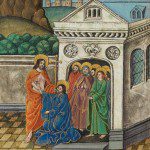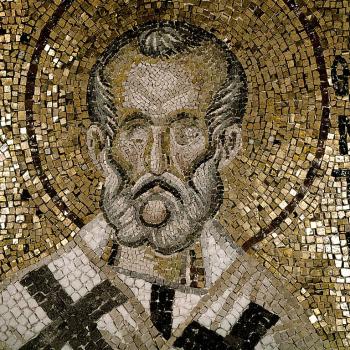![Saint Jerome by Theodoric of Prague [Public domain or Public domain], via Wikimedia Commons](https://wp-media.patheos.com/blogs/sites/637/2017/04/jerome-book-273x300.jpg)
Sadly, save for quotes found in the texts of other writers, like St John of Damascus, the works of St. Theotimus have been lost to us. Nonetheless, thanks to historians like Sozomen, his spirit lives on, allowing us to get a glimpse of his greatness: he was able to show prudence with charity, and not follow the bitter path of political polemics which we find in the life of other saints of his age, like Jerome and Epiphanius. This can be seen shen St. John Chrysostom found himself criticized by Theophilus of Alexandria, St Jerome, and St Epiphanius, for the comfort he gave to Origenist monks. St. Epiphanius tried to get Theotimus on his side, and speak out against Origen. St. Theotimus, however, held his ground and spoke in support of Origen:
Theotimus, bishop of Scythia, strongly opposed the proceedings of Epiphanius, and told him that it was not right to cast insult on the memory of one who had long been numbered with the dead; nor was it without blasphemy to assail the conclusion to which the ancients had arrived on the subject, and to set aside their decisions. While discoursing in this strain, he drew forth a book of Origen’s which he had brought with him; and, after reading aloud a passage conducive to the education of the Church, he remarked that those who condemned such sentiments acted absurdly, for they were in danger of insulting the subjects themselves about which these words treated.[2]
Theotimus knew how, in previous generations, the work of Origen was looked with much acclaim, that great men like St. Athanasius sought to show how their theology was in accord with Origen.[3] Theotimus believed that Origen was recognized as a true man of the church, who had been judged by the ancients as an invaluable authority to be respected for what he contributed to Christian theology.[4] In wisdom, then, Theotimus warned us not to condemn people of the past with anachronistic expectations. We can be critical, we can speak of errors of the past, we can show where mistakes were made, where sins were done, but to misconstrue the past, to expect out of the past all the advances which had been made in knowledge and understanding, would end up condemning not just Origen, but many great saints proclaimed by the whole church.
Theotimus’s wisdom helps give Christians the ability to read and study the holy men and women of the past, accepting their foibles, without having to condemn them and the church when we see, with hindsight, the mistakes they made. Grace lifts up and makes people greater than what they could be without it. If we were to be judged and condemned like the way we readily judge and condemn those who came before us, who among us would be saved? We must always strive for reform, but the reform must be filled with grace, a reform which includes mercy.
If this is all we knew and understood of Theotimus, we would have gained much. But he was a holy bishop, and apparently, a fearless wonder-working bishop who was able to move mountains, or at least Huns, when confronted by them, as Sozomen wrote:
The church of Tomi, and indeed all the churches of Scythia, were at this period under the government of Theotimus, a Scythian. He had been brought up in the practice of philosophy; and his virtues had so won the admiration of the barbarian Huns, who dwelt on the banks of the Ister, that they called him the god of the Romans, for they had experience of divine deeds wrought by him. It is said that one day, when traveling toward the country of the barbarians, he perceived some of them advancing towards Tomi. His attendants burst forth into lamentations, and gave themselves up at once for lost; but he merely descended from horseback, and prayed. The consequence was, that the barbarians passed by without seeing him, his attendants, or the horses from which they had dismounted. As these tribes frequently devastated Scythia by their predatory incursions, he tried to subdue the ferocity of their disposition by presenting them with food and gifts. One of the barbarians hence concluded that he was a man of wealth, and, determining to take him prisoner, leaned upon his shield, as was his custom when parleying with his enemies; the man raised up his right hand in order to throw a rope, which he firmly grasped, over the bishop, for he intended to drag him away to his own country; but in the attempt, his hand remained extended in the air, and the barbarian was not released from his terrible bonds until his companions had implored Theotimus to intercede with God in his behalf.[5]
He was, moreover, a man of prudence; converted to the faith as a philosopher, he lived his life in the true spirit of a philosopher:
It is said that Theotimus always retained the long hair which he wore when he first devoted himself to the practice of philosophy. He was very temperate, had no stated hours for his repasts, but ate and drank when compelled to do so by the calls of hunger and of thirst. I consider it to be the part of a philosopher to yield to the demands of these appetites from necessity, and not from the love of sensual gratification.[6]
It is with this prudence, this way of life, his mercy for others, his unwillingness to condemn Chrysostom and the Origenist monks at the behalf of Epiphanius and Jerome, makes sense. He was temperate as philosophy told him to be, not just with his own life, but with others. He was capable of reading and seeing in Origen the great mind which guided the church of his time. Theotimus was unwilling to condemn Origen for what the church had been able to develop for itself upon the foundation which Origen had handed over to it would have suffered greatly. This is not to say he could not and would not condemn outright heresy: he taught against Arianism, which was rampant in his day, so that his flock would not have to sail through the theological storm without a guide.
While Theotimus’s legacy suffers, in part, because his writings have all but been lost to us, we can stand firm with the church of our ancestors which determined his own holiness, and affirm his greatness as we invoke him as a friend and co-worker with Christ. Let us, therefore, take time to honor that man who honored God, and praise God for the wisdom of his which has come our way:
Since you are a pillar of the Church of Christ, you have overthrown the heresy of Arius, O wise Theotimus; / therefore, our God has adorned you, O most blessed hierarch Theotimus. / By your prayers, O all-holy one; guard the entire flock and the city of Tomis (Kontakion of Theotimus).
[1] St. Jerome, Lives of Illustrious Men in NPNF2(3): 383.
[2] Sozomen, Ecclesiastical History in NPNF2(2): 408.
[3] See for example, St. Athanasius, “Defense Of the Nicene Definitions” in NPNF2(4):168-9.
[4] St. Gregory the Wonderworker, a student of Origen, looked upon Origen with great respect and as an authoritative teacher who helped prepare Gregory for his missionary work. St. Pamphilus wrote a lengthy apology for Origen, which was edited and added to by Eusebius. Likewise the great Cappadocians received much of their theological training through the reading of Origen’s works.
[5] Sozomen, Ecclesiastical History, 395.
[6] Sozomen, Ecclesiastical History, 395.
Stay in touch! Like A Little Bit of Nothing on Facebook:
A Little Bit of Nothing











